6 Ways to Leverage SEO Platforms for Higher Rankings
Small publishers with limited resources often find it overwhelming to establish a strong online presence, risking losing potential users. However, there’s a solution to this pain point—SEO platforms. These platforms streamline the SEO process and provide valuable insights to inform digital marketing strategies.
This article will explore 6 ways SEO platforms can significantly impact digital marketing strategies.
What is an SEO Platform?
An SEO platform helps businesses optimize their website’s visibility and rankings on search engine results pages (SERPs). Some key features include the following:
- Keyword research
- On-page optimization
- Backlink analysis
- Competitor analysis
- Performance tracking
- Reporting
SEO platforms often integrate data from multiple sources and provide actionable insights and recommendations to improve a website’s organic search performance. They are valuable tools for digital marketers and website owners seeking to enhance their online presence, increase organic traffic, and achieve higher rankings on search engines.
What is the Goal of an SEO Platform?
One of the primary goals of SEO is to improve visibility on search engine results pages (SERPs). SEO platforms can assist in achieving this by providing data-driven insights on keywords, meta descriptions, and other factors that impact visibility.
With SEO platforms, businesses, whether in-house or with the help of an SEO agency, can optimize their content to rank higher in search results, leading to increased traffic to their website.
A study found that the top result on the search engine results pages (SERPs) receives 28.5% of all clicks, while the second result only gets 15.7% of clicks. Improved visibility can significantly impact the success of a business, making SEO platforms an essential tool in digital marketing.
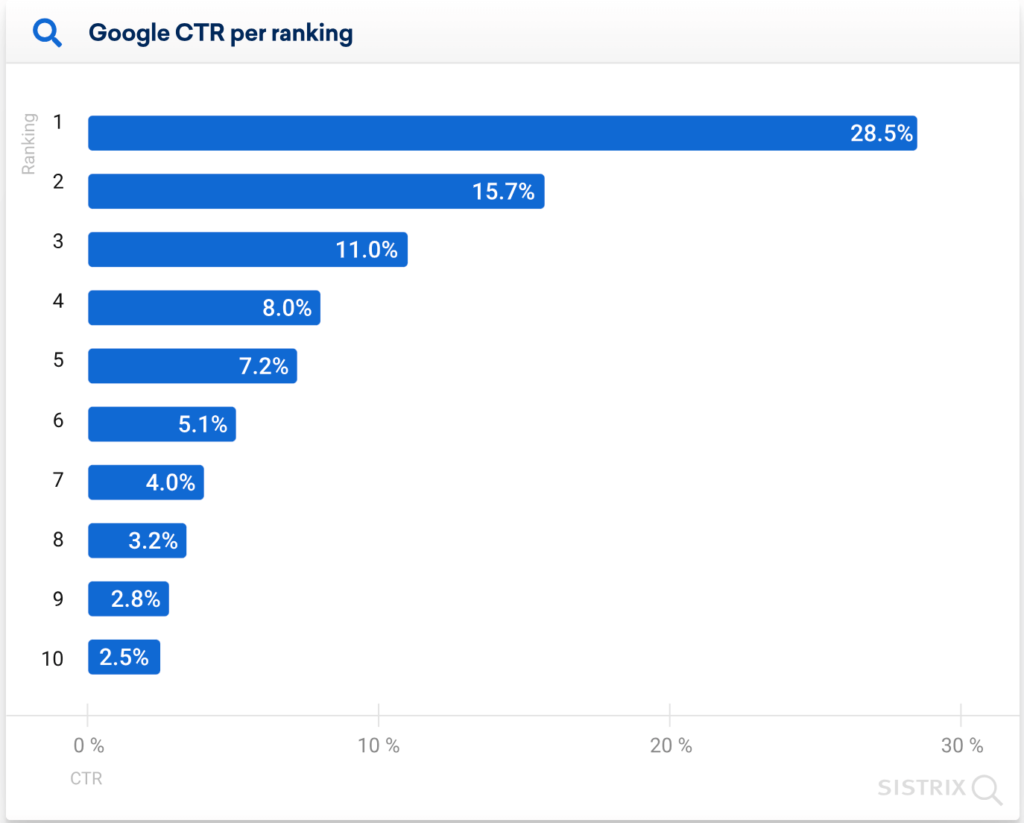
Source: Sistrix
- Research relevant keywords: Use an SEO platform to find keywords relevant to your business with high search volumes. Incorporate these keywords naturally into your website content to increase your chances of ranking higher on SERPs.
- Optimize meta descriptions: Your meta descriptions should be concise and compelling, using relevant keywords to entice users to click on your link. Use an SEO platform to analyze your meta descriptions and ensure they’re optimized for maximum visibility.
- Analyze your competitors: Use an SEO platform to analyze your competitors’ content and identify keywords they’re ranking for. Use this information to inform your own content strategy and stay ahead of the competition.
Ahrefs is a good example of this. This platform offers a range of features, including keyword research, backlink analysis, and content analysis. With Ahrefs, businesses can identify keywords with high search volumes and low competition, optimize their website content for search engines, and track their rankings over time. Using Ahrefs to improve their SEO strategy allows businesses to increase their online visibility and drive more traffic to their website.
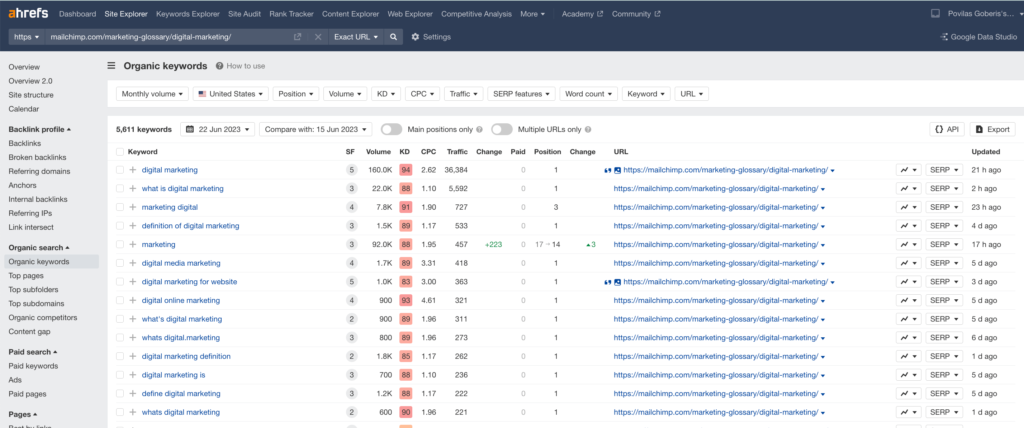
1. Keyword Research
Keyword research is a crucial component of effective SEO and businesses can optimize this process using SEO platforms to gain insights such as search volume, competition, and related keywords. Here are some actionable tips to make the most of keyword research:
- Look for long-tail keywords: While shorter keywords have high search volume, they also have high competition. Instead, use an SEO platform to find long-tail keywords that are less competitive but still relevant to your business.
- Focus on intent: Searcher’s intent refers to the underlying motivation or purpose behind a user’s search query on a search engine. It can be categorized into different types, such as informational intent (seeking information), navigational intent (looking for a specific website or page), transactional intent (intent to make a purchase), and commercial intent (researching products or services before making a decision).
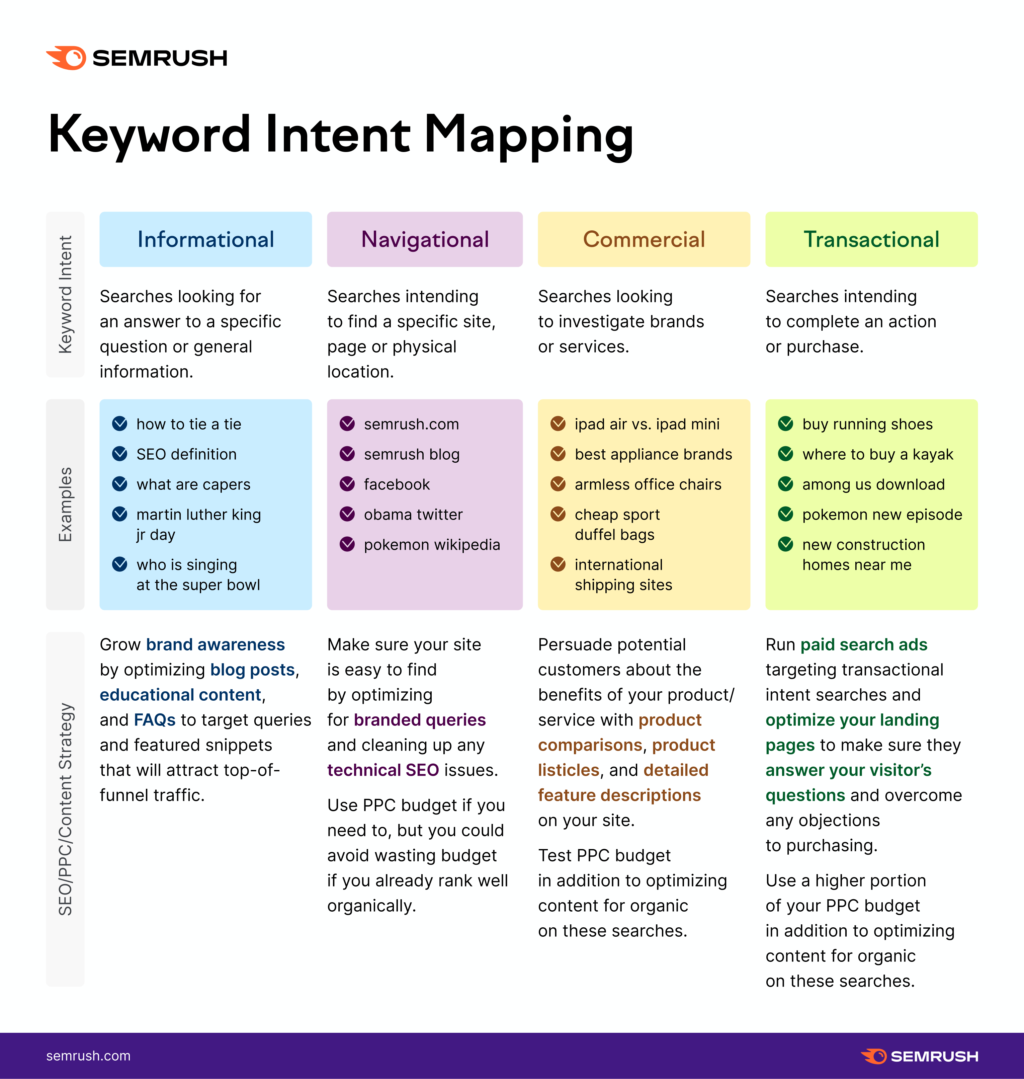
Source: SEMrush
You can create relevant and targeted content that satisfies the user’s search intent by identifying the dominant intent behind specific keywords or search queries. This improves the overall user experience, increases the likelihood of ranking higher in search engine results, and drives qualified organic traffic to the website.
- Monitor keyword performance: Use an SEO platform to track the performance of your keywords and adjust your strategy accordingly. This will help you stay ahead of the competition and ensure that your content remains relevant and optimized.
Moz is an example of an SEO platform that can assist with keyword research. This platform provides valuable insights on keyword performance, including search volume, competition, and related keywords and phrases.
2. On-page Optimization
On-page optimization refers to optimizing individual web pages to rank higher and earn more relevant traffic in search engines. It includes page titles, meta descriptions, header tags, and internal linking. SEO platforms can assist with on-page optimization by providing recommendations on these elements. Here are some tips to optimize on-page content:
- Use relevant keywords in page titles and header tags: Incorporate keywords in your page titles and header tags to make them more relevant to your audience and search engines. SEO platforms can suggest keywords that are relevant to your business and have a high search volume.
- Optimize meta descriptions: Write clear, concise, and compelling meta descriptions with relevant keywords to encourage users to click through to your website. Use an SEO platform to analyze your meta descriptions and ensure they’re optimized for maximum visibility.
- Internal linking: Use internal linking to improve your website’s structure and help search engines understand the relationships between pages. Use an SEO platform to identify pages on your website that could benefit from internal linking.
An example of an SEO platform that can assist with on-page optimization is SEMrush. This platform provides insights on on-page elements such as verifying your content’s originality, page titles, header tags, and meta descriptions. SEMrush can also help identify internal linking opportunities to improve their website structure and boost their online visibility.
3. Link-Building
Link-building is acquiring hyperlinks from other websites to your own. It is an essential aspect of SEO as it signals to search engines that other sites consider your content valuable and authoritative. SEO platforms can assist with link building by providing insights into link opportunities and monitoring the performance of existing links.
Here are some tips for businesses to boost their on-page optimization through link building:
- Identify relevant websites: Use an SEO platform like Ahrefs to identify websites relevant to your industry and audience and with high domain authority.
- Create valuable content: Create high-quality content that provides value to readers and is relevant to the website you’re targeting for link building.
- Outreach to website owners: Use an SEO platform to find the website owner’s contact information and send a personalized email requesting a link to your content.
Hunter.io is an excellent tool for individuals in the fields of marketing, sales, and link-building who require a reliable method to identify link-building opportunities and contact information of website owners. and editors. Besides, it has a handy Google Chrome extension that can be used to find contact information on any site.
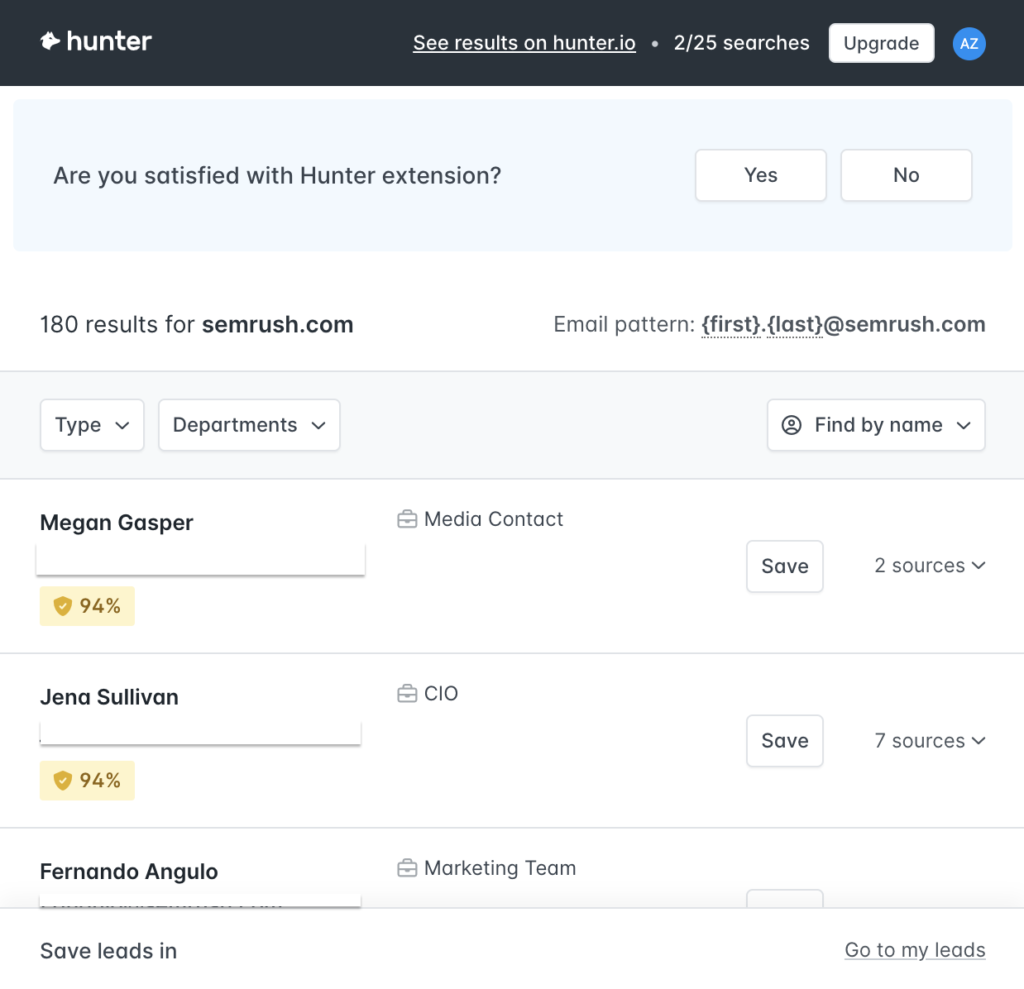
4. Analytics and Reporting
Analytics and reporting are critical aspects of digital marketing. They provide data-driven insights into the performance of a website and the effectiveness of digital marketing strategies. SEO platforms provide valuable analytics and reporting on traffic, rankings, and backlinks.
Here are some of the best practices for SEO analytics and reporting:
- Track website performance: Use an SEO platform like Google Analytics to track website traffic, user behavior, and conversion rates to identify areas for improvement.
- Monitor keyword rankings: By monitoring keyword rankings, you can identify which keywords are performing well and driving traffic to your website.
- Analyze backlink profile: It helps you understand the quality and quantity of backlinks pointing to your website. This analysis can provide insights into your site’s performance regarding search engine rankings.
Google Analytics is publishers’ top choice for providing insights into website traffic, user behavior, and conversion rates and helping businesses make data-driven decisions to improve their digital marketing strategies.
5. Technical SEO
Technical SEO optimizes a website’s technical aspects to improve search engine rankings. It includes website speed, mobile-friendliness, and website architecture. SEO platforms can assist with technical SEO by providing insights and recommendations on these elements.
For example, Google Search Console is a powerful SEO tool that provides detailed reports on website performance and helps identify technical issues such as broken links, crawl errors, and mobile usability issues. This approach allows businesses to take immediate action to improve their website’s technical aspects and increase their search engine rankings.
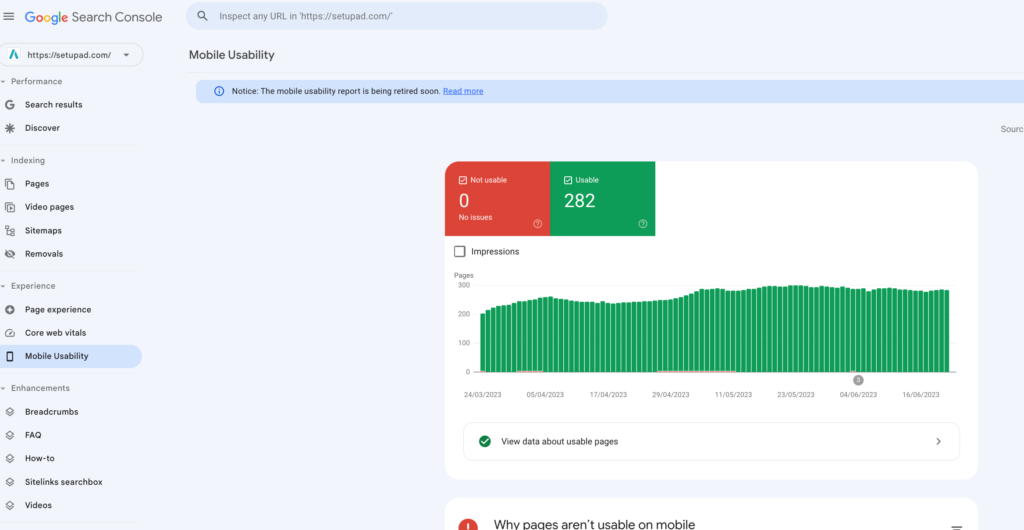
Regularly running technical SEO tests is also a great way to identify issues related to crawlability, indexing, and ranking of your web page. SEO Checker is a great tool that can assist with that, covering tests such as the noindex tag test, the SEO-friendly test, the favicon test, and many others.
Technical SEO can also impact a business’s broader digital marketing strategy by affecting the overall usability and accessibility of the website. This is why some businesses require candidates to have digital marketing degrees online or ask employees to take relevant SEO training. Some companies even develop mentorship programs to nurture and develop in-house digital marketing talent. Leveraging technical SEO through SEO platforms enables businesses to improve their website’s user experience, increase organic traffic, and ultimately boost their online visibility and revenue.
6. Mobile Optimization
Mobile optimization refers to the process of optimizing a website for mobile devices. With more and more users accessing websites via mobile devices, mobile optimization is critical for user experience and search engine rankings.
Here are some tips for using SEO tools for mobile optimization:
- Use responsive design: Make sure your website has a responsive layout that can adjust to different screen sizes, ensuring that your content is easy to read and navigate on any device.
- Optimize images and videos: Compress them to reduce load time and ensure they are optimized for mobile devices.
- Improve site speed: Use a content delivery network (CDN) to deliver content faster, reduce page load times and improve user experience.
Final Words
If you want to supercharge your digital marketing efforts, leveraging SEO platforms is an absolute game-changer!
These platforms offer invaluable insights into every aspect of your SEO strategy, from keyword research to analytics and mobile optimization. By using SEO platforms, businesses can optimize their web pages for search engines, enhance user experience, and ultimately drive more traffic to your website.

